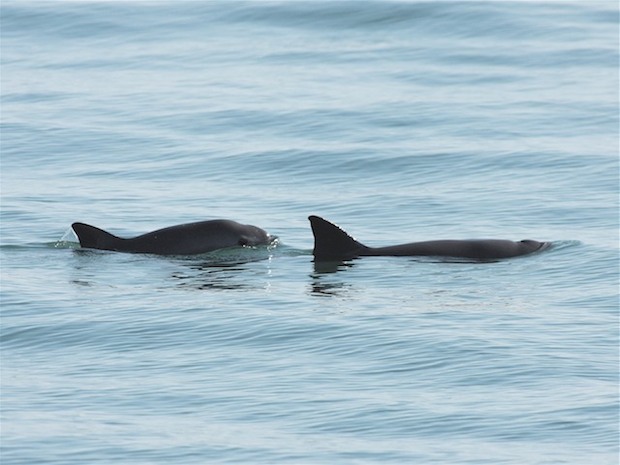World's most endangered marine mammal could go extinct
The world's smallest porpoise is fighting for its life.
Conservationists claim the numbers of critically endangered vaquita has dropped to only 50 - half what it was estimated to be just a few months ago. It is the most endangered of any of the 128 marine mammal species alive today.
"It's horrifying to witness, in real time, the extinction of an animal right in front of our eyes," said Sarah Uhlemann, international program director at the Center for Biological Diversity. "Without drastic help, vaquitas could vanish completely in just a few years. We need the world to wake up and help save these incredible porpoises."
The animal is found exclusively in the upper part Mexico's Gulf of California, also known as the Sea of Cortez.
In a report from the International Whaling Commission's Scientific Committee this month, scientists painted a gloomy picture for this shy marine creature. They warned that illegal fishing was to blame for much of the 42 percent decline between 2013 to 2014.
But it's not fishing for the vaquita that is the problem. Rather, the commission concluded illegal fishing and trading of another critically endangered species called totoaba caught using huge gill nets was the driver, resulting in "a high entanglement risk for vaquitas."
Uhlemann said that the totoaba's swim bladder is illegally exported to Asia to make soup and traditional medicine. Demand for totoaba bladders has spiked recently, and a single totoaba bladder can sell for $14,000.
'This rapid decline underscores the need for Mexico's strong recent actions to ban gill nets and increase enforcement to save the species," according to the report.
The news of the vaquita's demise comes just a month after the Mexican president announced a series of measures aimed at protecting the porpoise.
Among other things, President Enrique Peña Nieto said authorities would institute an emergency two-year gill net ban throughout the vaquita's distribution area, bolster enforcement including the purchase of high-speed patrol boats, establish a comprehensive program to compensate fishermen and fund a new survey to estimate vaquita abundance.
"The enforcement of the gill net ban will be adequate only if gill nets are prohibited in the current exclusion zone both at sea and on land and that survival of the vaquita depends on a permanent gill net ban," the commission report said. "(The ban) will only be successful if fishermen are given the opportunity to develop alternative livelihoods, including continuing to fish with small trawls for shrimp, with other gear and practices that do not pose a threat to vaquitas."
The United States came out in support of Mexico's conservation plan and Barbara Taylor, a conservation biologist with the National Marine Fisheries Service, said she was already hearing it is making a difference. A day before the plan was announced, Taylor said "there was no sign of enforcement happening" and the agencies responsible didn't even have a boat to monitor the fisheries.
"The day after the president handed things over to the Navy, there were arrests," Taylor said. "By all reports, the ban is working and that is really exciting. But the real test will come when the shrimp season opens in the middle of September."
Taylor, who will be part of a team doing a two-month vaquita survey later this year, said she is also cheered by a Mexican commitment to spend $32 million a year to compensate fishermen not to fish for the next two years. That should end the practice of placing miles and miles of gill nets in the Gulf, allowing many species to start recovering, offering space to try alternative methods (like putting nets behind trawlers) and building a market for vaquita-friendly seafood.
"It's really important to support Mexico and the Mexican fishermen using fishing gear that doesn't kill vaquita." she said. "The use of gill nets is killing hundreds of thousands of porpoises and dolphins worldwide. If we lose the vaquita, it's going to be a domino effect. A lot of dolphins and porpoises will be lost unless we can solve this problem with gill nets."
Environmental groups welcomed the Mexican plan, too, but say the Obama Administration must do more.
They requested that the U.S. government impose trade sanctions against Mexico to stop the country's illegal totoaba fishery. That could include a boycott of shrimp from Mexico. Groups have also sought "in danger" status for the Gulf of California World Heritage site that was designated, largely to protect the vaquita and the totoaba.
"We're truly at the brink of losing the vaquita forever," said Zak Smith, staff attorney with the Natural Resources Defense Council's Marine Mammal Protection Project. "It's inexcusable that vaquita are paying the price for Mexico's history of ineffective and half-hearted efforts to 'protect' them. Now, only the most extreme measures will help, and that means a zero-tolerance enforcement of the gill net ban in the Gulf of California."
